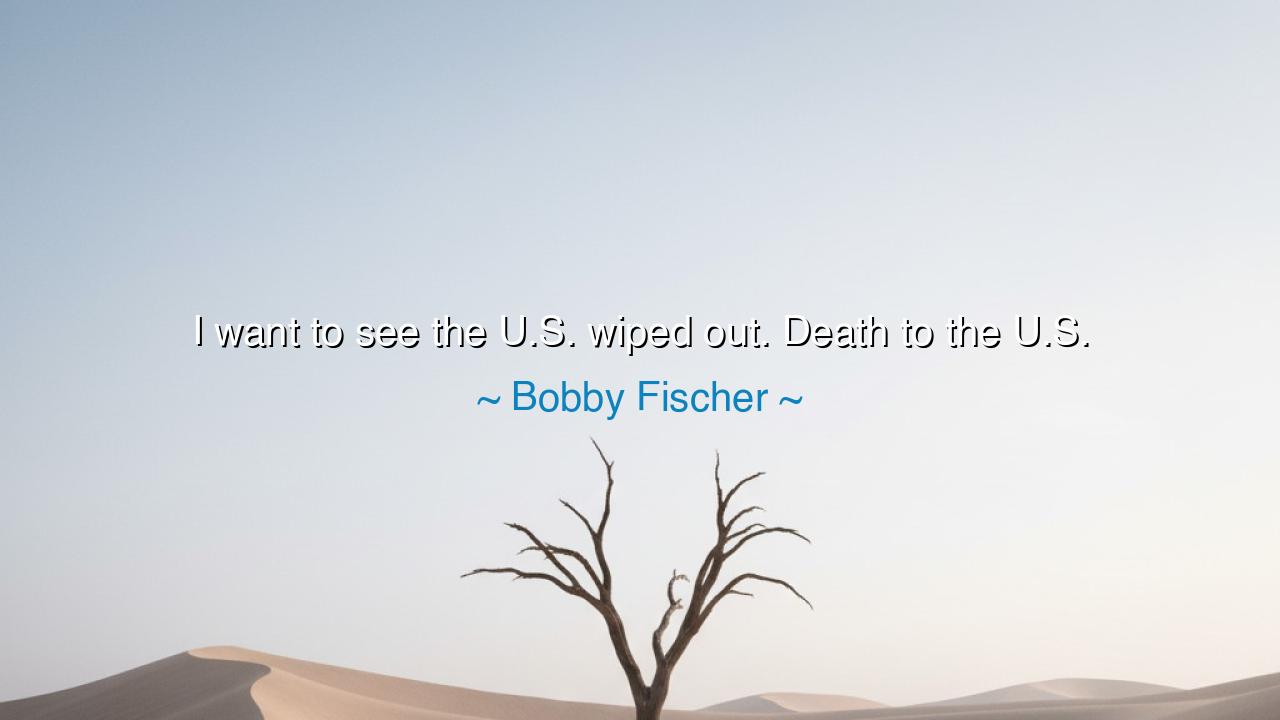
I want to see the U.S. wiped out. Death to the U.S.






The words of Bobby Fischer — “I want to see the U.S. wiped out. Death to the U.S.” — fall like a thunderbolt from a man once hailed as genius, and the shock of them forces us to ask hard questions. Who speaks thus, and why? Fischer was not born a prophet of violence; he was a child of chess, a comet of prodigious talent who, in 1972, sat at the board and made an entire world look up. Yet in later years, ostracized, embittered, and adrift, his voice turned poisonous. The violent phrase must be understood as the cry of a troubled soul — a mind that, having been exalted and then rejected, chose rancor instead of reconciliation. That context does not excuse the words; it only helps us see how genius can be twisted by grievance into something cruel.
To trace the origin of such fury we must recall the arc of Fischer’s life. He rose from obscurity to dethrone an empire of chess, then withdrew into exile after disputes with federations and governments. He felt persecuted — by rules, by money, by the political storms that swirled around the game he loved. Where once he was celebrated as a bridge between East and West during the Cold War, later sanctions, legal troubles, and isolation hardened him. In that brittle interior, anger found language. The sentence “I want to see the U.S. wiped out” is therefore less a reasoned political program than the raw vent of a man whose suffering metastasized into hatred. It is the thunder after a long drought of care.
The ancients understood such corruption of spirit. They told of heroes who, when pride and loss took hold, became monsters in their own story. In Greek tragedy, the proud fall into hubris and speak blasphemies against gods and men; in Rome the exile became the enemy. Fischer’s transformation is not unique: human beings, when wounded and unhealed, can turn their pain outward as a demand for cosmic revenge. But the ancients also teach remedy — the way back is through recognition, community, and the tempering of anger by wisdom. Words that call for the annihilation of peoples are not the language of justice; they are the language of ruin.
It is necessary also to look outward: history shows that violent rhetoric yields violence in return. When leaders or influencers call for the destruction of a people, states or societies pay the price—cycles of retaliation, suffering, and long shadows of trauma. A contrast instructs us: Nelson Mandela, who endured long imprisonment, emerged not to call for retribution but for reconciliation; his refusal to settle with hatred saved a nation from prolonged bloodshed. Where Fischer’s words point toward ruin, Mandela’s choice points toward repair. The lesson is stark: the tongue that invokes annihilation severs the possibility of rebuilding.
So what moral should we carry from these harsh syllables? First, recognize that violent speech is consequential. It wounds communities and corrodes the speaker. It cannot be treated as mere eccentricity nor as clever provocation; it must be confronted with honest repudiation and with efforts to understand root causes. Second, remember that greatness in one domain — chess, art, intellect — does not inoculate a person against moral failure. We may admire a player’s skill while condemning his call to violence. Discernment is the virtue that lets us keep both truths.
Practically, what must we do when confronted by such words? Speak clearly: condemn calls for violence without silencing attempts to diagnose grievance. Support civic institutions that channel anger into constructive change — mediation programs, mental-health services, and civic education that teach critical thinking and empathy. If someone you know drifts toward rhetoric of annihilation, do not flinch; reach out, listen without endorsing the hatred, and help connect them to counseling or community support. Societies are not healed by ignoring the sick; they are healed by treating them and by repairing the social conditions that breed despair.
Finally, remember the deeper injunction of the ancients: the measure of a civilization is how it treats both its most exalted and its most broken. Let Fischer’s words stand as a warning — that brilliance without compassion can become a force for harm — and let them also spur us to act: to bind wounds before they fester, to teach restraint where rage tempts, and to convert grievance into service. Hate says “wipe out”; wisdom answers, gently but firmly, “heal.”






AAdministratorAdministrator
Welcome, honored guests. Please leave a comment, we will respond soon